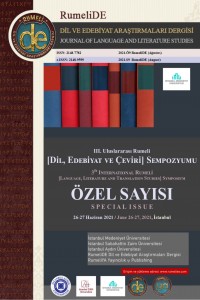Abstract
Modern Türk edebiyatının inşasına roman ve hikâyeleriyle mühim bir katkı sağlayan Mehmet Rauf, Eylül romanı yazarı olarak anılmaktadır. Yazarın sadece bu romanı ile anılması, kaleme aldığı diğer eserlerine gereken önemin verilmemesine sebep olur. Oysaki Mehmet Rauf, yazın hayatı boyunca 13 roman, 143 hikâye, birçok mensur şiir ve piyes kaleme alır. Ayrıca nitelik olarak da edebi bir değere sahip olan bu eserler, yazarın Modern Türk nesrinin gelişimindeki rolünü gözler önüne sermektedir. Mehmet Rauf’un Menekşe adlı romanı ilk olarak 1913 yılında Servet-i Fünûn’da tefrika edilir ve 1915’te kitap olarak basılır. Servet-i Fünûn Topluluğu’nun dağılmasından sonra kaleme aldığı bu eserinde Mehmet Rauf, aşk teması çerçevesinde dönemin edebi faaliyetlerine ve bir roman kahramanı olarak Servet-i Fünûn yazarının edebiyat ve hayat hakkındaki düşüncelerine de değinmektedir. Eserin başkişisi olan Hüseyin Bülend, Servet-i Fünûn neslini temsil eder. Bu yönüyle Hüseyin Bülend, aynı zamanda Mehmet Rauf’un devrin edebiyatına ve sosyal hayatına dair fikirlerini yansıtan bir aynadır. Mehmet Rauf’un bütün eserlerinde odak noktası olan aşk, bu romanında da merkezdedir. Ancak Menekşe edebiyat tarihi bağlamında da değerlendirilebilir. Bu çalışmada, Mehmet Rauf’un Menekşe adlı eseri, Servet-i Fünûn neslinin bir roman kahramanı olarak konumu, Servet-i Fünûn edebiyatının temaları ve edebiyat hakkındaki bahisler çerçevesinde incelenecektir.
References
- Akyüz, K. (1995). Modern Türk edebiyatının ana çizgileri 1860-1923. İnkılâp.
- Cevdet Kudret (1971). Türk edebiyatında hikâye ve roman 1859-1959. Bilgi.
- Çıkla, S. (2001). “Halit Ziya ve Mehmet Rauf’un hayatları ile romanları”. Dergâh, 12, 14-17.
- Çıkla, S. (2004). Roman ve gerçeklik bağlamında kültür değişmeleri ve Servet-i Fünûn romanı. Akçağ.
- Engin, E. (2012). “Menekşe romanı hakkında”. Menekşe, Palet, 7-10.
- Enginün, İ. (2020). Yeni Türk edebiyatı Tanzimat’tan Cumhuriyet’e (1839-1923). Dergâh.
- Kavcar, C. (1985). Batılılaşma açısından Servet-i Fünun romanı. Kültür ve Turizm Bakanlığı.
- Mehmet Rauf (2008). Edebî hatıralar. Kitabevi............................
- Mehmet Rauf (1331), Menekşe. Muhtar Halid Kütüphanesi, Teshîl-i Tıbâat Matbaası.
- Mehmet Rauf (2012). Menekşe. (Haz. Ertan Engin), Palet.
- Özbalcı, M. (1997). Mehmet Rauf’un romanlarında şahıs kadrosu. Milli Eğitim Bakanlığı.
- Paliçko, E. (2020). Edebiyat-ı cedide roman ve hikâyesinde deneyim. Ankara Hacı Bayram Veli Üniversitesi Lisansüstü Eğitim Enstitüsü Yayımlanmamış Doktora tezi.
- Şener, Z. (2016). “Edebiyat-ı Cedîde karamsarlığının bir sembol olarak Ahmet Cemil”. III. Genç Akademisyenler Sempozyumu Bildiri Kitabı, Epamat Basım Yayın, 357-377.
- Tanpınar, A. H. (2016). Edebiyat üzerine makaleler. (Haz. Zeynep Kerman), Dergâh.
- Tarım, R. (2000). Mehmet Rauf’un hayatı ve hikâyeleri üzerine bir araştırma. Akçağ.
- Törenek, M. (1999). Roman ve hikâyeleriyle Mehmet Rauf. Kitabevi.
Abstract
Mehmet Rauf, who made an important contribution to the construction of modern Turkish literature with his novels and stories, is known as the author of the Eylül novel. The fact that the author is mentioned only with this novel causes the other works he has written not to be given the necessary importance. However, Mehmet Rauf wrote 13 novels, 143 stories, many prose poems and plays during his literature life. In addition, these works, which have a literary value in terms of quality, reveal the role of the author in the development of Modern Turkish prose. Mehmet Rauf's novel Menekşe was first serialized in Servet-i Fünûn in 1913 and published as a book in 1915. In this work he wrote after the collapse of the Servet-i Fünûn Community, Mehmet Rauf also touches on the literary activities of the period within the framework of the theme of love and the thoughts of the author of Servet-i Fünûn on literature and life as a novel hero. Hüseyin Bülend, the head of the work, represents the generation of Servet-i Fünûn. In this respect, Hüseyin Bülend is a mirror that reflects Mehmet Rauf's ideas about the literature and social life of the period. Love, which is the focal point in all of Mehmet Rauf's works, is also at the center of this novel. However, Menekse can also be evaluated in the context of literary history. In this study, Mehmet Rauf's work named Menekşe, the position of Servet-i Fünûn generation as a novel hero will be examined within the framework of the themes of Servet-i Fünûn literature and the discussions on literature.
References
- Akyüz, K. (1995). Modern Türk edebiyatının ana çizgileri 1860-1923. İnkılâp.
- Cevdet Kudret (1971). Türk edebiyatında hikâye ve roman 1859-1959. Bilgi.
- Çıkla, S. (2001). “Halit Ziya ve Mehmet Rauf’un hayatları ile romanları”. Dergâh, 12, 14-17.
- Çıkla, S. (2004). Roman ve gerçeklik bağlamında kültür değişmeleri ve Servet-i Fünûn romanı. Akçağ.
- Engin, E. (2012). “Menekşe romanı hakkında”. Menekşe, Palet, 7-10.
- Enginün, İ. (2020). Yeni Türk edebiyatı Tanzimat’tan Cumhuriyet’e (1839-1923). Dergâh.
- Kavcar, C. (1985). Batılılaşma açısından Servet-i Fünun romanı. Kültür ve Turizm Bakanlığı.
- Mehmet Rauf (2008). Edebî hatıralar. Kitabevi............................
- Mehmet Rauf (1331), Menekşe. Muhtar Halid Kütüphanesi, Teshîl-i Tıbâat Matbaası.
- Mehmet Rauf (2012). Menekşe. (Haz. Ertan Engin), Palet.
- Özbalcı, M. (1997). Mehmet Rauf’un romanlarında şahıs kadrosu. Milli Eğitim Bakanlığı.
- Paliçko, E. (2020). Edebiyat-ı cedide roman ve hikâyesinde deneyim. Ankara Hacı Bayram Veli Üniversitesi Lisansüstü Eğitim Enstitüsü Yayımlanmamış Doktora tezi.
- Şener, Z. (2016). “Edebiyat-ı Cedîde karamsarlığının bir sembol olarak Ahmet Cemil”. III. Genç Akademisyenler Sempozyumu Bildiri Kitabı, Epamat Basım Yayın, 357-377.
- Tanpınar, A. H. (2016). Edebiyat üzerine makaleler. (Haz. Zeynep Kerman), Dergâh.
- Tarım, R. (2000). Mehmet Rauf’un hayatı ve hikâyeleri üzerine bir araştırma. Akçağ.
- Törenek, M. (1999). Roman ve hikâyeleriyle Mehmet Rauf. Kitabevi.
Details
| Primary Language | Turkish |
|---|---|
| Subjects | Linguistics |
| Journal Section | Turkish language, culture and literature |
| Authors | |
| Publication Date | August 21, 2021 |
| Published in Issue | Year 2021 Issue: Ö9 |


